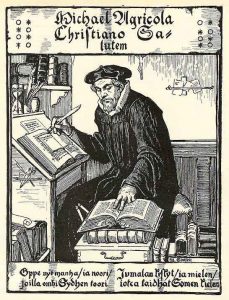In Sweden and Finland, the reformation was a political manoeuver led by the King, but this is not the whole picture. Many members of the clergy had a considerable influence on the outcome of the northern Reformation. It was, after all, a matter of religion in the first place, and therefore theologians, priests and bishops were in a position to alter the religious decisions.
In Sweden, Olavus Petri had a significant role in the Reformation. He had studied theology in Wittenberg, and had heard Martin Luther’s ideas very early on. Returning to Sweden, he quickly became the leading figure in the Reformation of Sweden together with his brother Laurentius Petri. They organised the Church anew and translated texts into the vernacular following the example of Luther. Olavus Petri was also one of the very first priests to get married. As a matter of fact, he got married even some months before Luther himself, on the 12th of February 1525.
Many Finnish priests studied in at the University of Wittenberg and were active in the Reformation. The most well-known is Mikael Agricola, who has been named the Reformer of Finland. He was born circa 1510 in

Mikael Agricola. A 19th century engraving by Albert Edelfelt. Wikimedia Commons.
Pernaja, in the region of Uusimaa. He studied first in Viipuri (Vyborg) in eastern Finland, but then moved to Turku in 1528. Together with his childhood friend Martinus Teit, he went to Wittenberg in 1536 to study theology. Mikael Agricola very probably visited Martin Luther’s house as a student. He studied under Phillip Melanchthon, who was a more active teacher than Luther at the university at the time of Agricola’s stay, and Agricola refers to him as “his teacher”.
Agricola translated and wrote many books in Finnish, his magnum opus was the translation of the New Testament into Finnish. He had already begun the work in Wittenberg together with his friend Martinus Teit and Simon Henrici Wiburgensis, a Finnish priest, who later was appointed as a teacher at the University of Wittenberg. Mikael Agricola was the only Finnish reformer who managed to get his writings printed, and has therefore had a more lasting influence and has been better commemorated than the others.
Returning to Turku in 1539, Agricola was appointed as rector of the Cathedral School, and in 1544 he was consecrated as the Bishop of Turku, being the first Lutheran Bishop of Finland. He was married to Pirjo Olavintytär (‘Bridget, the daughter of Olavi’) and had one son, Christian, who ended up Bishop of Tallinn in 1584. Agricola died in 1557 during his return from Moscow as part of a royal delegation to negotiate a peace treaty.
Leave a Reply